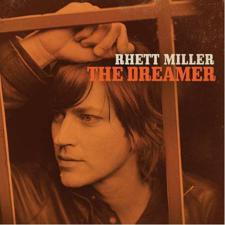
Rhett Miller
The Dreamer
(Maximum Sunshine; 2012)
By Maura McAndrew | 14 June 2012
Rhett Miller is not cool. One might think he is, for a minute, because he’s really fucking good looking, and he has a good haircut, and the Old 97’s were kind of cool back in the ’90s before their shows were stocked with dads. But you would be wrong. Rhett Miller is earnest, cheerful, friendly; married and forty-ish, prone to waxing metaphorical about love. His new solo effort The Dreamer is a kind of 1970s singer-songwriter record featuring songs about sunshine, moonlight, children, and gardens. He’s vogue-ing on the cover like a catalog model. Accepting it, as a person admittedly bound by the conventions of cool, can be awkward. But The Dreamer, for all its cheesiness, is really, truly _ good_. It’s the record that Miller’s probably always wanted to make, and he’s finally assembled the right group of people to help him, written the right kinds of songs, and shrugged off the need, so conspicuous earlier in his career, to fit certain expectations and be anything other than himself.
The first indication that The Dreamer is going to fare better then Miller’s past few solo efforts (the acceptable Rhett Miller [2009] and the egregious The Believer [2006]) is the fact that he’s assembled an honest-to-goodness backing band. The “Serial Lady Killers” include guitarist Tommy Borscheid, bassist Greg Beshers, and drummer Angela Webster, who, as I observed last week in concert, all compliment Miller beautifully, adding a much-needed fullness to his songs. Another delightful thing about The Dreamer is that Miller has a fantastic female backing vocalist on almost every song, mixing it up among Roseanne Cash, Rachel Yamagata, and Heather Robb (of the Spring Standards). His only full-on duet here is “As Close as I Came to Being Right” with Cash, which is reminiscent of The Believer’s only bright spot “Fireflies,” a duet with Yamagata. Miller is at his best when playing off another vocalist, and he and Cash create a beautiful vintage-country atmosphere with this, one of the record’s strongest songs.
The attention to detail afforded Miller by his band is truly what gives The Dreamer its magic. Most of the songs feel rich, combining the power pop of Miller’s debut The Instigator (2002) with the country leanings of the Old 97’s. The opening quartet of songs in particular—beginning with “Lost Without You”—is a breathless stream of some of the catchiest pop melodies out there right now, complete with flourishes in the form of subtle piano, swelling pedal steel and rockabilly guitar. Miller’s vocal performance on songs like “Out of Love” and “Sleepwalkin’” demonstrates again what we’ve heard from him on the past two Old 97’s records—a growing awareness of dynamics, and a willingness to tone it down and slip into a character. The Rhett Miller of “Time Bomb” is still in there, but he knows that not every song needs to hit those levels of exuberance.
Basically, The Dreamer is a very traditional record, straight-up pop with a tinge of alt-country. It’s easy company, a warm and thoroughly enjoyable summer listen, and that’s Miller’s sneaky songwriting expertise at work—it’s not easy, after all, to make music this ingratiating. However, as the record goes on, the corny factor becomes a bit…challenging. “Love Grows” and “Picture This” are two forehead-slapping numbers—the former really does actually talk about gardening and love in the same breath, and the latter begins with the lyrics “Picture this / Many years from now / Me and you / You and me / And our two little children,” and…it’s just sort of icky. Thankfully Miller recovers with the record’s final track “Sweet Dreams,” a short, charming throwback number that departs just enough from the record’s overall sound as to keep things interesting to the final notes.
Elements of The Dreamer should be, as Rhett Miller would say (and does, on “Long Long Long”), wrong, wrong, wrong. So why is it that I like this chipper, guileless record so immensely? Does it help that when I saw him play last week, he performed a generous two-hour-plus set of classics, got drunk on seemingly very few beers, and attempted to play every fan request despite forgetting the words? Yeah, it does. Because even at those moments when Miller’s being cheesy and embarrassing, his music, like his enthusiasm, feels genuine. There was a time, around the release of The Believer, when Miller was criticized for trying to be some kind of slick LA hotshot, leaving behind his Texas roots. But whatever happened there has been thoroughly reversed with The Dreamer: he’s grown stronger as a musician by leaving behind notions of stardom and music-biz niche. In light of this, The Dreamer becomes an ironic title, because it seems that now that Miller’s let go of any lingering major label dreams, he’s truly found success.





